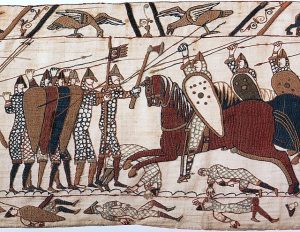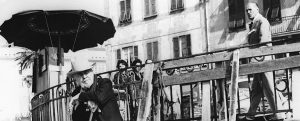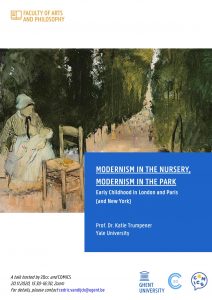20cc is proud to announce two exciting activities for the new year!
Uses of Modernism international conference, 20-22 September, 2023
This conference seeks to reconsider the Modernist concept in the wake of the post-colonial and global turn in the humanities and social sciences. More specifically, it investigates the category of Modernism from a global, interartistic and interdisciplinary perspective to discuss its contemporary uses and values within the ongoing decanonization and decolonization of research and teaching agendas.
Keynote speakers include: Prof. Sascha Bru (KU Leuven), Prof. Tsitsi Ella Jaji (Duke University) and Prof. Xudong Zhang (New York University)

Deadline for abstract submission: 15 February 2023.
Full CFP here: Call for Papers – Modernism 2023
Specialist course for PhD students on Representations of Violence in Literature and Other Media, 4-5 May 2023
This doctoral course aims to reflect critically on the concept of violence and provide insight into its literary and media representations. Participants are invited to explore different forms of violence and the ways they are portrayed in literature and other media, such as newspapers, magazines, television, radio, film, social media, and other digital media. Experts will shed light on the historical, socio- cultural, and political aspects of violence and outline methods for understanding representations of violence in local and global contexts. The course is interdisciplinary in nature, drawing on literary studies, critical theory, political science, environmental studies, gender studies, memory studies, and other fields and disciplines.
Confirmed international experts include : Dr Pavan Malreddy (Goethe University Frankfurt, Germany), Dr Esther Marijnen (Wageningen University, the Netherlands), Prof. Sayak Valencia Triana (Colegio de la Frontera Norte, Mexico) and Prof. Jenny Wüstenberg (Nottingham Trent University, UK)

Deadline: 1 February 2023.
Please see the CFP here: Call for Papers_ DS Violence
Talk at CLIC: “Ezra Pround and Radio Treason”
On Wednesday 27/4, at 2 pm, Marius Hentea (University of Gothenburg) will deliver an online talk on “Ezra Pound and Radio Treason.” The lecture critically discusses the American poet Ezra Pound’s fascist broadcasts from Italy to the US during the Second World War, focusing on Pound’s idiosyncratic interpretation of radio propaganda and the shifting notion of “treason” during the War. All are welcome. For the MS Teams link, please write to birgit.van.puymbroeck@vub.be.

20cc activities in spring 2022
3 March, 11:30-12:30, Blandijn (Faculteitszaal), talk by Dr Lorenzo di Paola (University of Messina/University of Salerno) on “Digital Comics: Media and Generational Transformations.” In cooperation with COMICS.
25 March, 9:45-17:15, VUB (I.1.03), audioworkshop on “Radio and Cultural Memory.” In cooperation with CLIC and SEL. As places are limited due to COVID regulations, please register your attendance by 21 March 2022 via email to sofie.vandepitte@vub.be.
- 9:45: welcome
- 10:OO-11:20: Erica Harrison, ‘We are letting the facts speak for themselves’: The Use of National Socialist Archive Recordings in DDR Radio Features & Vitus Sproten, The Sound of Free Radio (1975-1985)
- 11:20-11:30: coffee break
- 11:30-12:50: Siebe Bluijs, New Sounds from ‘The Digital City’ & Alexander Badenoch, Recalling Radio (as) Sound: Quintessence and its Archival Consequences
- 12:50-14:00: lunch break
- 14:00-15:20: Richard Legay, At the Crossroads of Comics and Radio History: Le Feu de camp du dimanche matin, an intermedial case study & Inge Arteel, By Word of Mouth: Marlene Streeruwitz’ Profanation of the Life of Maria in her Radiophonic Vocal Collage Maria (2015)
- 15:20-15:30: coffee break
- 15:30-16:50: Birgit Van Puymbroeck, Life Writing on Air: Henry Reed’s metabiography for radio “Hilda Table” & Lars Bernaerts, The Personal is Poetical: Lucienne Stassaert’s autobiographies of Sylvia Plath and Emily Dickinson (1995-6)
- 16:50-17:15: concluding remarks
28 March, 19:00, Brussels Comics Art Museum, inaugural Lorand lecture by Andreas Fickers (University of Luxembourg) on “Unflattening European History through Transmedia Storytelling: The Making Europe Digital Comics Series.” This lecture is organized by CLIC.
31 March, 8:30-9:45, Blandijn (room 2.25), talk by Dr Lorenzo di Paola (University of Messina/University of Salerno) on the Italian children’s magazine, Corriere dei Piccoli. In cooperation with COMICS.
27 April, 14:00, online, talk by Prof. Marius Hentea (University of Gothenburg) on “Ezra Pound and Radio Treason.” This talk is organized by CLIC.
13 May, Serialities Day the Faculty Library (Library Lab Magnel). In cooperation with COMICS.
24-25 May, Children’s Drawings in Comics symposium (more information coming soon).
Conference Cfp: “Experimental Writing in English (1945-2000): The Anti-Canon” (15-16 September 2022, Brussels)
Keynote speakers:
ISABEL WAIDNER, Senior Lecturer in Creative Writing/Performance, Queen Mary, University of London. (Second keynote speaker TBC)
CALL FOR PAPERS
This conference aims to focus on experimental writing in English from the second half of the twentieth century which is less well known, has been positioned outside of the literary mainstream or is simply deserving of more attention. It particularly invites proposals on experimental writing by women, queer authors, people of colour and working-class writers.
Much research in recent years has been concerned with nuancing accounts of post-WWII literature which either largely ignored experimental writing in the wake of the war and/or only paid attention to certain canonical postmodernist texts when experimentation was considered. In Breaking the Sequence: Women’s Experimental Fiction (1989), Ellen Friedman and Miriam Fuchs proposed that twentieth-century experimentation by women might be the missing link in the crucial intersection between feminism and modernity as literature and feminism share a “profound quarrel with established, patriarchal forms, but also a sense of identification with what has been muted by these forms” (xii). Since their groundbreaking work and especially in recent years, several anthologies and critical studies have contributed to the ongoing project of rectifying the critical neglect of women’s experimental writing of the second half of the twentieth century. The absence of contributions by writers of colour, queer authors and working-class writers to most conversations about experimental literature is similarly striking and problematic. Thus, Anthony Reed, in Freedom Time: The Poetics and Politics of Black Experimental Writing (2014), has suggested that the “abstractness” of black experimental writing and its resistance to “preemptive understandings of black life” has resulted in the exclusion of experimental writing in standard genealogies of African American literature (7).
This conference then adopts the term “anti-canon” as a provocative invitation to reflect on the ways in which experimental literature in English in general – but writing by certain authors in particular – has regularly been neglected or sidelined in overviews of the literary landscape in the second half of the twentieth century. By adopting the term, we also acknowledge and invite reflections on Ellen Friedman’s suggestion that if canonical novels are strategic constructs to reinforce a society’s values, then works which undermine those values might be thought of as “anticanonical.”1 More recently, Tyler Bradway has connected the “affective agency” of formal innovation to a specifically queer tradition in literature in Queer Experimental Literature: The Affective Politics of Bad Reading, suggesting this agency reveals “literary form’s capacity to work on and through the bodies of readers, immanently restructuring our felt relations to the aesthetic object” (viii).
Following on from this recent research on the topic, this conference invites reflections on the following questions: To what extent can the notion of anti-canon represent a shared condition for the politics of experimentation? In what ways does it engage with, and perhaps suggest a move beyond, certain categories – such as that of “women’s writing” – as the “other side” of dominant literary form? How might anti-canonical works of literature subvert established ways of looking at the world and at society?
As this Call for Papers makes clear, at the heart of this conference is a flexible understanding of both the terms “anti-canon” as well as “experimental literature,” which we use as an umbrella term to investigate, analyse, and celebrate the more formally innovative end of the wide spectrum of writing in English during the period 1945-2000.
In addition to reflections on the above questions, the organisers invite papers on a range of topics and authors, including, but not limited to:
- Experimental prose, poetry, drama, life writing, non-fiction and art writing by women, queer authors, people of colour and working-class writers.
- Experimental writers who have received relatively little sustained critical attention in the past or to date, such as Kathy Acker, Renata Adler, Gloria Anzaldúa, Russell Atkins, Amiri Baraka, Rachel Blau DuPlessis, Christine Brooke-Rose, Brigid Brophy, Theresa Hak Kyung Cha, Maxine Chernoff, Eva Figes, Nikki Giovanni, Renee Gladman, Barbara Guest, Carlene Hatcher Polite, Lyn Hejinian, Fanny Howe, Anna Kavan, Bernadette Mayer, Naomi Mitchison, Haryette Mullen, Eileen Myles, Suniti Namjoshi, Alice Notley, Ann Quin, Oliver Pitcher, Michèle Roberts, Sonia Sanchez, Ntozake Shange, Denis Williams and others.
- The meanings, definitions and employment of “experiment” in the second half of the 20th century.
- Theorisations regarding the anti-canon and what it might mean to read experimental texts in thisframework.
- Interconnections and overlaps between eras and movements, including but not limited to relationshipsbetween post-war experimental literature, modernism, “late modernism” and/or postmodernism.
- Transnational connections and experimental writing in English which questions (Western) borders,categories and assumptions.
- The categorisation and theorisation of experimental writing in the post-WWII era.
- The question of how experimental writing by women, queer authors, people of colour and working-classwriters was/is received.
- The idea of the “death of the novel” and the troubling of different literary categorizations.
- The role and influence of publishing networks in relation to experimental writing.
- The employment and function of “experimental” techniques within “realist” works.
- Formal experimentations in the context of trauma, grief and/or radical vulnerability.
- Multimodal literature.
- Affects at work in experimental literature.
Proposals (ca. 300 words), together with a biographical note, should be sent to Hannah Van Hove (havhove@vub.be) and Tessel Veneboer (Tessel.veneboer@ugent.be) by 2 May 2022. Proposals for panels of three interlinked papers are also welcome, as are experimental and/or creative-critical approaches to papers.
This conference is planned as an on-site event to be held in Brussels.
Organised by Hannah Van Hove (Vrije Universiteit Brussel) and Tessel Veneboer (Universiteit Gent), in association with the research groups CLIC (Centre for Literary and Intermedial Crossings), SEL (Studiecentrum Experimentele Literatuur) and 20cc (Twentieth-Century Crossroads).
Three activities this November!
We’ve got three exciting events planned with the COMICS group this month:
17 November, 9:00-12:00, talk and discussion by Prof Kees Ribbens (NIOD/Erasmus University Rotterdam) on “How to Frame War in WWII Comics: Issues of Representation and Formats”
19 November 15:00-17:00, unpacking of French filmmaker, writer and editor, Norbert Moutier’s juvenilia by Xavier Girard (ESAD, Orléans)
30 November 9:30-11:00, talk by Alicia Lambert (Université catholique de Louvain), “Drawing Back, Revealing and Subverting Belgian Colonial Legacy in Comics”
“Text, Image, Sound: Intermedial Crossings in Twentieth-Century Mass Media” (28-30 April 2021)
On 28-30 April, 20cc hosted a specialist course for PhD students from Flemish universities who work on or are interested in intermediality. All the info, including schedule and registration, can be found here.
You can listen to Prof Alexandra Saemmer’s opening lecture, “Electronic Literature and Mass Media: Pollination, Hybridization and Colonisations,” here:
.
“Modernism in the Nursery, Modernism in the Park” (20 November 2020)
We’re happy to announce the first 20cc lecture by Prof Katie Trumpener!
